Last night I received the 2019.24.4 software update for our Model 3. So this morning I tested Tesla’s CHAdeMO adapter to determine the rate of charge, and see how many miles I’d get and how long it would take to charge from a given SOC. Summary: 45 minutes gave me 139 miles of rated range and cost $8.69. Tesla’s CHAdeMO adapter is easy to use and provides more charging options for the Model 3.
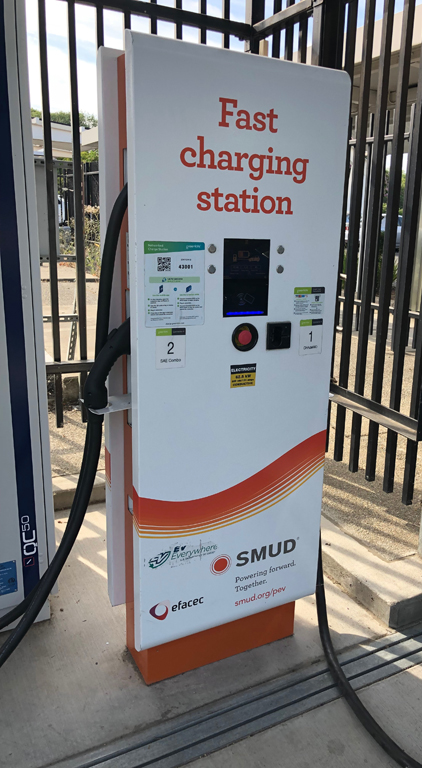
This site where I charged has one DC charger with dual plugs to charge EVs with either CHAdeMO or CCS charging ports. It can charge one car at a time, delivers a maximum of 125 amps, and provides maximum power approaching 50 kW depending on factors such as state of charge, battery pack temperature, etc. I arrived at the station with 126 miles of rated range – 39% SOC – in our long range RWD Model 3.

If you haven’t used CHAdeMO chargers before the plugs are substantial, and by that I mean big. But using the adapter, while not dead simple like a Supercharger, was straightforward and easy: I removed the CHAdeMO plug from its holster on the charger, connected it to Tesla’s CHAdeMO adapter, and plugged the adapter into the Model 3’s charging port.
This station is operated by Greenlots. To start a charging session you either call their 1-800 number, use the Greenlots phone app, or a Greenlots RFID card. I have a Greenlots account and their RFID key fob so I held the key fob next to the labeled sensor on the charger and it verified my account. The charger provides you with easy to follows instructions. I pressed the button to select the CHAdeMO plug, and then pressed the button again to start the charging session.
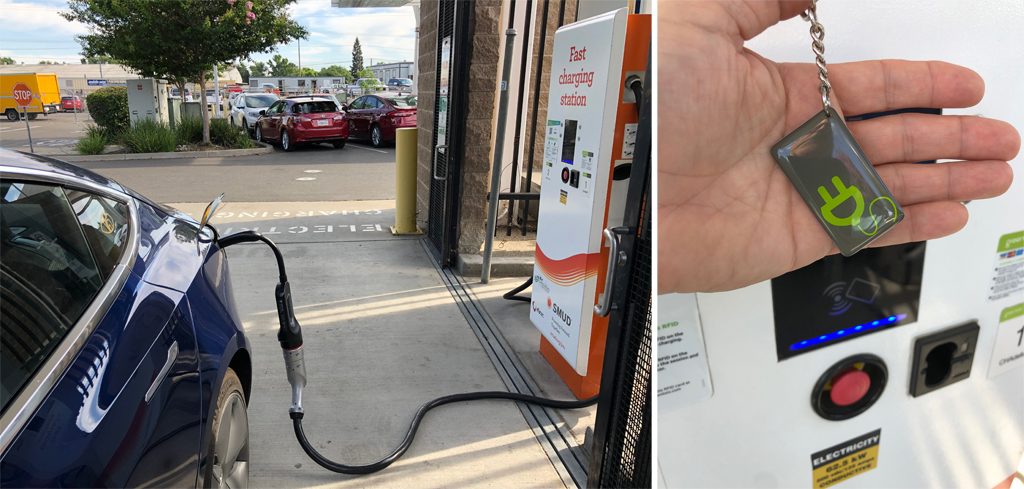
The charger delivered 22.8 kWh in the first 30 minutes, providing about 90 miles of rated range.

The session started with the charger delivering 42 kW when the battery pack was at 39%. The power slowly increased, hitting 49 kW when the battery pack reached 80% SOC. I didn’t charge long enough to see where the taper would begin, but I’m guessing that would be in the range of 80-85% SOC.
It took a total of 45 minutes to go from 39% to 81% SOC. This included the time it took me to plug in and initiate the session. In 45 minutes the charger delivered 33.7 kWh (according to Greenlots), adding 139 miles of rated range to the pack.
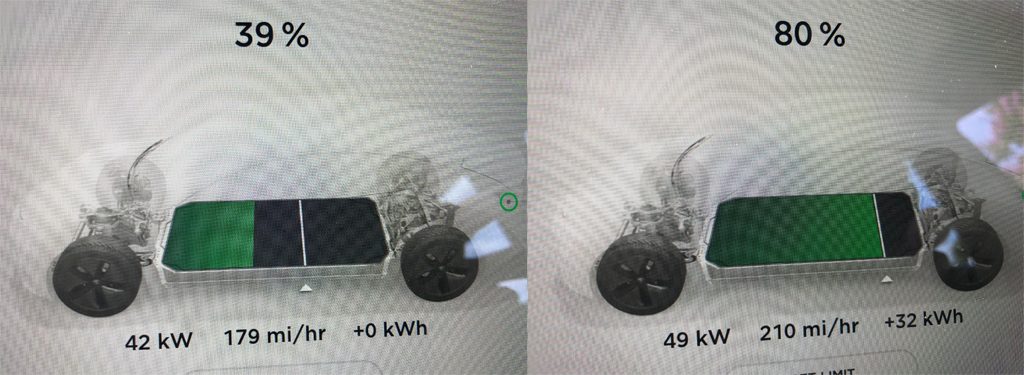
At this location Greenlots charges 25¢ per kWh, plus taxes and a 35¢ session fee. Total cost for this charge was $8.69, so just under 26¢ per kWh, which is comparable to the cost of using a Supercharger. The cost of using CHAdeMO chargers varies depending on the network that operates the station.
CHAdeMO charging stations are not Superchargers, yet. Some of the new stations coming online provide more than 125 amps, but I believe Tesla’s current CHAdeMO adapter will accept no more than 125 amps (please correct me if I’m wrong). CHAdeMO chargers don’t span the entire country, and generally don’t have as many charging stalls per site compared to most Supercharger locations. But some regions of the country have a good number of CHAdeMO charging locations that support EV drivers. So while 139 miles in 45 minutes is slower than a Supercharger, it’s better than L2 charging. Most importantly this gives us more charging options for road trips and regional travel.
I’ve used this station before to charge our 2012 Toyota Rav4 EV, thanks to Tony Williams’ CHAdeMO charging port, JdeMO. Adding the CHAdeMO charging port to our Rav4 EV expanded the horizons of that car, and I expect the CHAdeMO adapter to come in handy for our Model 3. I don’t expect to use it for local charging, but plan to use the adapter on longer trips we have planned.
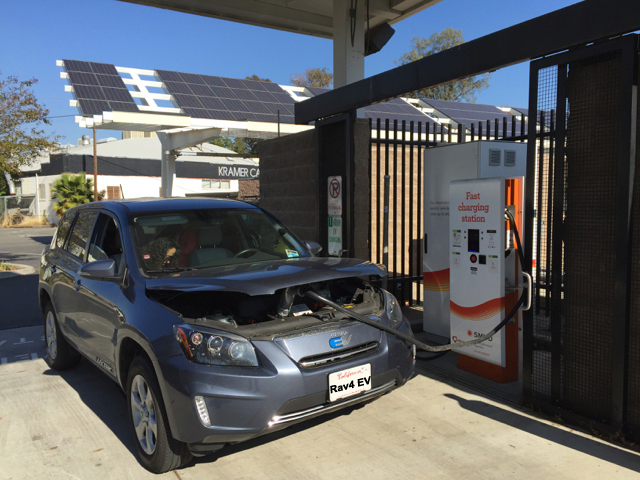
If you are new to EVs and want to know how to find CHAdeMO charging stations, Plugshare is a very good resource. Go to that website (or download the phone app), click on the filter tab, and select CHAdeMO (or any other type of charger) to find charging locations near you.
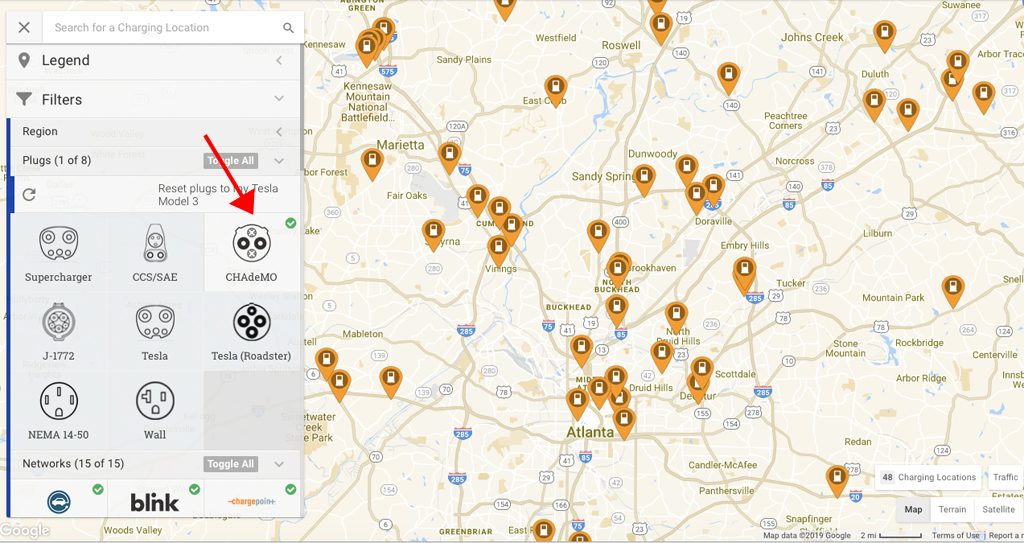
Final note: In the United States the two non-Tesla DC charging standards are CHAdeMO and CCS. The CHAdeMO charging standard was designed and promoted by Japanese power companies and auto manufacturers including Nissan and Mitsubishi. The Nissan Leaf, which came on the market in 2010, is the best selling EV with the CHAdeMO port. Other auto manufacturers use the CCS DC charging standard. Cars with the CCS port include the Chevy Bolt EV, BMW i3, VW e-Golf, and other European made EVs coming on the market. Ultimately cars with a CCS port will outnumber those with CHAdeMO. At some point Tesla may sell a CCS adapter for use in the United States, but there’s no indication of that yet.
This guest post from Steve Noctor originally appeared on his blog It’s Electric.
Last edited by a moderator:


